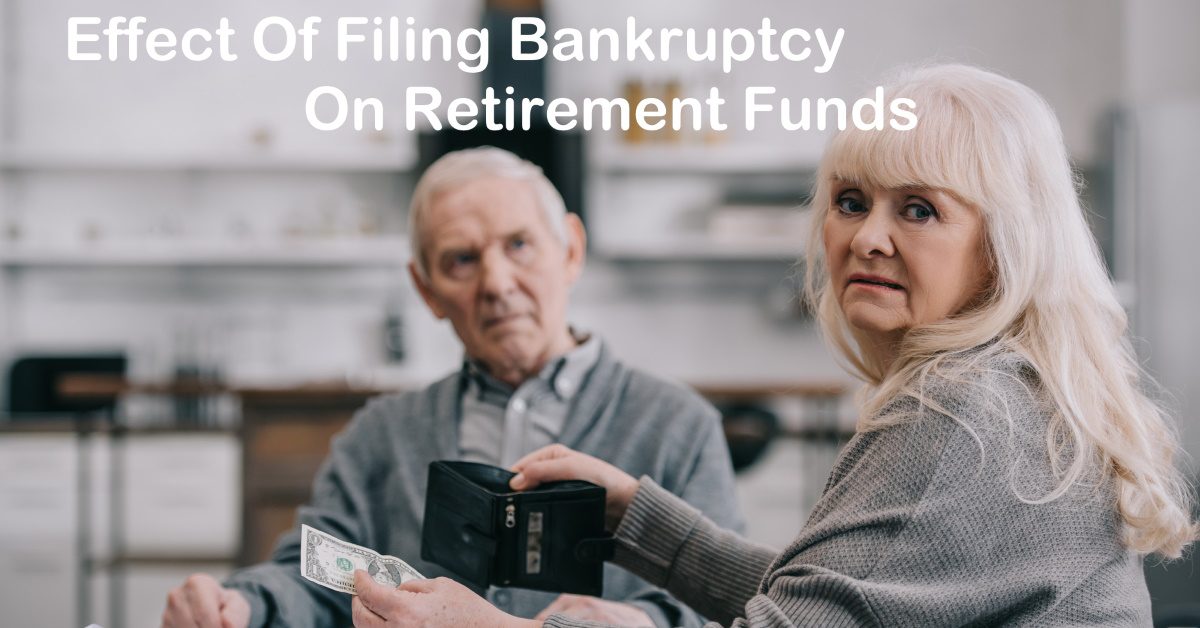We often get this question from our clients: What is the effect of filing bankruptcy on retirement funds?
One thing is clear – With very limited exceptions, virtually all retirement funds are exempt and therefore, protected in bankruptcy. You can read more about exempt property or assets here.
Types of Retirement Plans
First, you want to consider which type of retirement plan you have. Types of retirement plans include:
- Traditional IRA (Individual Retirement Account)
- Roth IRA
- Simple IRA
- SEP-IRA
- TSP (Thrift Savings Plan)
- 401(k)
- 403(b)
- Keogh
Other plans/pensions, including but not limited to federal Employee Retirement Income Security Act (ERISA) retirement accounts.
“It is imperative to remember that if funds are withdrawn from the retirement account, regardless of what account into which they may be deposited, they lose their exempt, or protected, status.”
Bankruptcy Forum


Additionally, some states require you to use their exemptions, some states give you the option of using their state exemptions or the Federal exemptions, and some states require you to use only the Federal bankruptcy exemptions. Maryland, for example, requires the use of State exemptions exclusively.
I.R.A.
IRAs have some similarities to 401 Plans, except that they are set up and controlled individually instead of by the employer. However, IRAs are not required to comply with the ERISA rules, the potential unlimited exemption amount for a retirement plan does not necessarily apply to an IRA. The good news is, there are some circumstances under which a simple IRA may qualify for the unlimited ERISA unlimited amount exemption. Furthermore, even if you have a non-ERISA retirement plan, up to $1,512,350.00 can be exempt when applying the federal exemptions, as of April 1, 2022. (This cap will be adjusted again in 2025).
Further, certain specific retirement funds are exempt in Bankruptcy under Non-bankruptcy law. These funds include:
- Civil Service Employees
- Military service employees
- Military medal of honor recipients
- CIA employees
- CIA Employees
- Foreign Service Employees
It is imperative to remember that if funds are withdrawn from the retirement account, regardless of what account into which they may be deposited, they lose their exempt, or protected, status. This holds true with the limited exception of social security benefits, which retains its exempt status so long as it is deposited to an account dedicated solely to your social security funds.
This additional protection of Social Security funds arises from the fact that with a regular retirement fund you can choose when to withdraw funds, while with Social Security payment is automatically made directly to the recipient by the Government.
Thrift Savings Plan (TSP)
What effect does a Bankruptcy filing have on a Thrift Savings Plan TSP? A TSP is similar to a 401K Retirement Plan. It is a retirement plan for federal government employees and members of the uniformed services. Simply put, your money that is held in a TSP is “held in trust” for your benefit by the fund. These TSP funds are fully exempt as well, regardless of the amount in your account, and fully protected from the grasp of creditors in Bankruptcy.
Relevant Bankruptcy law [5 U.S.C. Ss8437 e(g), enforced under 11 U.S.C. Ss541 (c) (2)] provides that this retirement fund cannot be assigned nor alienated, or subject to execution, levy, attachment, garnishment, or other legal processes. The result of these protection laws is that your TSP never actually becomes a part of your Bankruptcy estate and is fully exempt.
A logical follow-on to the exempt status of a TSP is the question of whether a loan against a TSP can be discharged in bankruptcy, as so many unsecured debts are. The answer is “no”, a loan from the TSP cannot be discharged because it is not a “debt”. This is the case because you are borrowing, or “accessing” your own money, and repaying it back to your account. (See 11 U.S.C. 523 (a) (18) (b).
Accordingly, it is important to know that repayment of the TSP loan must continue even if in bankruptcy. Failure to do so could risk IRS taxes and penalties.
Additionally, whether in Chapter 7 or Chapter 13 the Bankruptcy Court does not have the authority to change the timing or amount of your loan payments, and you are not required, nor are you permitted to, make TSP loan payments through a Chapter 13 Plan. You simply continue timely payments outside your Chapter 13 Repayment Plan.
Pension
Pensions are not retirement funds, in the strict sense. A Pension is a regular payment made during a person’s retirement from an investment fund to which that person or their employer has contributed during their working life. This is an arrangement made with an employer to pay money to an employee after retirement.
A pension plan is a defined benefit plan into which an employer contributes with a guaranteed lump sum upon the employee’s retirement. A retirement plan is a savings and investment plan that provides income after the employee ceases employment.
Pension plans are generally excluded from the Bankruptcy estate and would not be assets against which the Bankruptcy Court Trustee may make a claim. You can expect that your pension is protected (exempt) in bankruptcy, or excluded, if:
- It is a plan which is automatically excluded. Check with your Plan Administrator to obtain the Internal Revenue Administration code section and if it is automatically excluded from attachment or claim in your Bankruptcy.
- A State or Federal exemption protects your interest in your Pension.
You must be cautious in this regard, as some employment benefits such as stock option plans are not necessarily qualified for protection by automatic exemption.
Simply put, any pension which qualifies under ERISA, and several other types, are exempt and thus protected. A “Non-qualified” pension, however, may be considered an asset of the Bankruptcy estate. Even in that event, however, it may be possible to exempt all or a portion of non-qualified pensions under other bankruptcy exemptions, depending upon its value.
In Maryland, a debtor can use available exemptions under C.J.P. Ss 11-504. Also, it is important to remember that once protected retirement or pension funds are received, they lose their protected status and may be exempt only under relevant state or Federal exemption law.
What to do Next
Remember, funds are treated differently after they are withdrawn, and you stand a greater chance of losing them. A withdrawal of these protected funds just prior to filing bankruptcy would subject these funds to a claim as an asset of the Estate in Bankruptcy and may stress your available exemptions. It is generally advisable not to do so without legal advice.
These are all very complicated issues and a primary reason why you should seek the advice of a competent bankruptcy attorney. Furthermore, these retirement funds are one of your most treasured assets; assets that you have been building up over a certain period. The Law Offices of Daniel J. Guenther are here to help you. Give us a call at (301) 475-3106. We are prepared to meet with you at our offices, remotely, and by phone.






